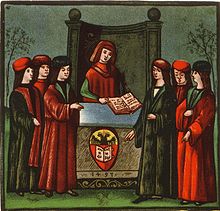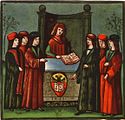Nicolaus Comnenus Papadopoli
Nicolaus Comnenus Papadopoli (italienisch Niccolò Comneno Papadopoli, griechisch Νικόλαος Κομνηνός ΠαπαδόπουλοςNikólaos Komninós Papadópoulos; * 6. Januar 1655 auf Kreta; † 20. Januar 1740 in Padua) war ein italienischer Kirchenrechtler und Historiker griechischer Herkunft.
Leben und Werk
Sein Vater war Giovanni Papadopoli, ein Notar der Republik Venedig in der Inselhauptstadt Candia, heute Iraklio (Ηράκλειο).[1]
An der Universität Padua wirkte er als Bibliothekar und gab 1726 unter dem Titel Historia Gymnasii Patavini ein zweibändiges Werk über deren Geschichte heraus. Es fand in verschiedenen Ländern wegen darin erwähnter prominenter Persönlichkeiten Aufmerksamkeit, wobei Papadopoli letztlich für seine Fehler bekannt wurde: In England interessierte man sich vor allem für seine Anekdoten aus dem Leben Oliver Cromwells. Da sich aber der (spätere) Lordprotektor nie in Italien aufgehalten hatte, muss Papadopolis’ hier einer Verwechslung aufgesessen sein oder wissentlich eine Unwahrheit verbreitet haben.

In der Geschichtsforschung Deutschlands und Polens galt lange Zeit Papadopolis Angabe, Nicolaus Copernicus habe sich zum Studium der Medizin bei der natio Polona immatrikuliert. Nach Mitte des 19. Jahrhunderts überprüften unter anderem Baldassare Boncompagni und Antonio Favaro[2] die alten Matrikel und stellten fest, dass es zu der Zeit in Padua gar keine polnische Verbindung gab, in der er sich der spätere Astronom hätte eintragen können. Damit ging die Darstellung Papadopolis als Papadopoli-Fälschung[3] in die Geschichte der Copernicus-Biografien ein. Carlo Malagola erforschte die Unterlagen der Universität Bologna und stellte fest, dass dort 1496 ein Nicolaus Kopperlingk de Thorn in den Akten der Natio Germanica verzeichnet war – was allerdings nicht beweist, wo statt bei der nicht existenten Natio Polona Kopernikus sich in Padua tatsächlich immatrikuliert hatte. Die Fehler und korrekte Belege in Deutschland ins allgemeine Bewusstsein zu bringen, war das Verdienst des Coppernicus-Biografen Leopold Prowe.
Papadopolis bekanntes Werk über Kirchenrecht sind die Prænotiones mystagogicæ ex jure canonico. Darin schrieb er über die Gültigkeit oder Ungültigkeit von Ehen orthodoxer Priester, nach der Priesterweihe eingegangene Ehen seien verboten, aber trotzdem gültig.
Literatur
- Sir James Burrow: A few anecdotes and observations relating to Oliver Cromwell and his family. J. Worrall, London 1763. (Electronic reproduction: Thomson Gale, Farmington Hills, Mich. 2003. Google Buchsuche)
- K. E. Von Moy de Sons, Fr. H. Vehring: Archiv für Katholisches Kirchenrecht. Verlag Franz Kirchheim, Mainz 1863 (Google Buchsuche)
- Christian Pletzing: „Deutsche Kultur“ und „polnische Zivilisation“ Geschichtsbilder in West- und Ostpreußen zwischen Vormärz und Kulturkampf. In: Matthias Weber: Preussen in Ostmitteleuropa: Geschehensgeschichte und Verstehensgeschichte. Oldenbourg Wissenschaftsverlag, 2003, ISBN 3-486-56718-7, S. 189–204.
- Stefan Kirschner, Andreas Kühne: Die Rezeption von Copernicus im Spiegel seiner Biographien. In: Rudolf Seising, Menso Folkerts, Ulf Hashagen (Hrsg.): Form, Zahl, Ordnung. Studien zur Wissenschaftsgeschichte. Festschrift für Ivo Schneider zum 65. Geburtstag. (= Boethius. Band 48). Steiner, Stuttgart 2004, S. 467–479. (Google Buchsuche)
Weblinks
- Schriften von Papadopoli im Opac des Servizio Bibliotecario Nazionale
- Normeintrag im Opac des SBN
- Prænotiones mystagogicæ ex jure canonico in der Nationalbibliothek Florenz
Einzelnachweise
- ↑ Alfred Vincent: Comedy. In: David Holton (Hrsg.): Literature and Society in Renaissance Crete. Cambridge University Press, 1991, S. 103–128, hier: S. 103, Anm. 2.
- ↑ As for the assertion that Copernicus was registered as a Pole at Padua, that was investigated, at the instance of Prince Boncompagni, by Favaro, and found utterly baseless. On the other hand, Carlo Malagola, in his admirable work on Urceo Codro showed that „Niccolo Kopperlingk di Thorn“ had registered as a law student at Bologna in the album of the „Nazione Alemanna“. This may not prove much, but it is, at least, not an invention. – Charles Sanders Peirce im Magazin The Nation, Ausgabe 5. Oktober 1893, in seiner Antwort auf einen Leserbrief zur Frage Was Copernicus a German?, S. 185–186: To the editor of The Nation: Sir, in your review of Mr. Oliver Lodge’s book on the ‘Pioneers of Science’, I was quite surprised to read that the father of Copernicus – and Copernicus himself necessarily too – was believed to have been a German. I had always taken it for a well-established fact that Copernicus was a Pole by birth and nationality. Copernicus is merely a Latinized form of the original name Kopernik, which corresponds with it in sound; and Kopernik is not a German, but a Slavonic name. It is not Polish, but Bohemian, and in the light of documentary evidence the family of the Koperniks can really be traced back to Bohemian ancestry. The zemani (knights) of Kopernik were Bohemian noblemen whose name appears in the historical records of the fourteenth century, and has been preserved to this day in the name of the Bohemian village Kopernik, their former seat, situated between the cities of Kosmonosy and Bakov in northeastern Bohemia. In the records of the fifteenth and sixteenth centuries the name can no longer be found, but a clue to its disappearance may be found in the archives of the city of Cracow. Dr. Lodge says: „His father is believed to have been a German.“ True, this is the belief, and it is founded on an accurate knowledge of the genealogy of the family, which, for a family of merchants, was locally far from obscure. … bears the figure of a man; so does the escutcheon of Copernicus. Copernicus went to study at a Polish University, Cracow, in preference to that of Leipzig, and when in Italy, at the University of Padua, he registered as a Pole and not as a German. – J. J. Král, Chicago, Ill., September 18, 1893" books.google.com. Abgedruckt in: Kenneth Laine Ketner, James E. Cook: Charles Sanders Peirce: Contributions to The Nation, Part One: 1869–1893. Texas Tech University Press, 1975, ISBN 0-89672-154-X. (online).
- ↑ The fact was asserted by Papadopoli in 1726, and found a place in all subsequent biographies of Copernicus; but the decorative particulars added by the historian of the Patavian university having been shown wholly incorrect, it seemed unreasonable to rely on his discredited authority for the fundamental circumstance. – Sydney Smith und weitere: The Edinburgh Review: Or Critical Journal. 1883, A. and C. Black (online).
| Personendaten | |
|---|---|
| NAME | Papadopoli, Nicolaus Comnenus |
| ALTERNATIVNAMEN | Papadopoli, Niccolò Comneno (italienisch); Papadópoulos, Nikólaos Komninós; Παπαδόπουλος, Νικόλαος Κομνηνός (griechisch) |
| KURZBESCHREIBUNG | italienischer Kirchenrechtler und Historiker griechischer Herkunft |
| GEBURTSDATUM | 6. Januar 1655 |
| GEBURTSORT | Kreta |
| STERBEDATUM | 20. Januar 1740 |
| STERBEORT | Padua |
Auf dieser Seite verwendete Medien
Aufnahme in die „Natio Germanica Bononiae“, die deutsche Nation an der Universität Bologna, Darstellung aus dem 15. Jahrhundert
